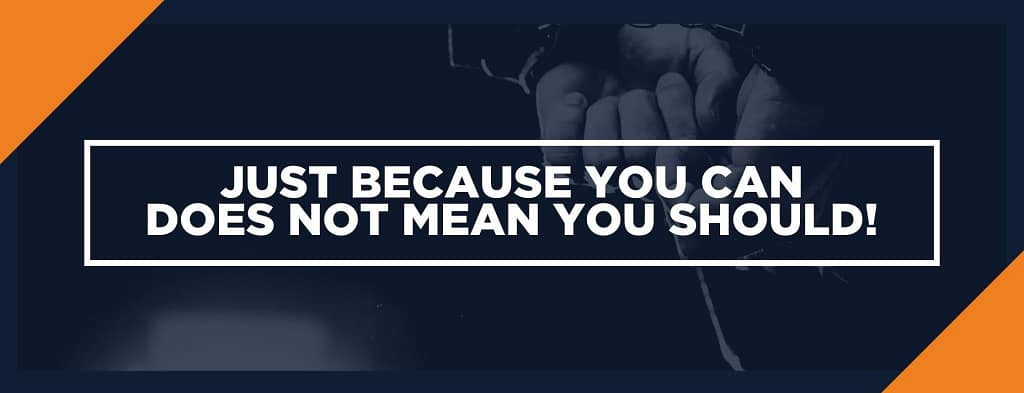As more and more companies and government organizations hire private security firms, companies will often ask, “What can security guards legally do?” Below, we shine some light on primary areas that have a thin line separating what security guards can do and cannot do!
Before we dive in, it is critical to point out that there are national, state, and even city/county regulations that will affect what security guards can do in various situations. Additionally, the contract between the security firm and the company responsible for hiring the firm will cause different needs, too.
Detaining Customers
This is a primary example of what security guards cannot do! Only police can detain a person. But in situations that might require a citizen to be detained prior to the police arriving, a security guard can arrest an individual under citizen’s arrest. Let us first define the two terms.
Definition of Detain: (According to US Legal)
In criminal law, detain means to hold a person in custody, often for purposes of questioning. A law enforcement officer needs to have a reasonable suspicion of unlawful activity to detain a person. Reasonable suspicion is less than the probable cause needed to arrest a person. The reasonableness of the length of time of detention will depend on the circumstances in each case.Definition of Citizen’s Arrest (According to Cornell Law School):
An arrest made by a private citizen, in contrast to the typical arrest made by a police officer. Citizens arrests are lawful in certain limited situations, such as when a private citizen personally witnesses a violent crime and then detains the perpetrator.

The main difference between “detaining” and “citizen’s arrest” is, a police officer can detain someone based on probably cause. Whereas a private security guard can only place an individual under citizen’s arrest when the crime is committed in their presence, and they see it.
Now, do not be mistaken. A well trained security guard can be extremely effective in situations where they do not see the actual crime take place.
How? By escorting the individual outside while simultaneous notifying the police. Often, by the time the security guard and perpetrator get outside, the police will be onsite or nearby. (Obviously, this is not full proof. But a security guard can distract an individual and keep them onsite long enough for the police to arrive.)
Search an Individual
However, a security guard cannot search a person without reason, just like a police officer cannot search an individual “just because.” There has to be a threat and reasonable cause for the security guard to search the individual.

Now, a security guard/company can require individuals to walk through a security checkpoint (that uses screening technology) when entering an event or private property. However, the individual can refuse to go through the checkpoint! In which case, the security guard can refuse entry. The important takeaway here is that, a security officer cannot make someone go through the checkpoint, but they can deny access to anyone who refuses to go through the screening checkpoint.
Searching Bags
Searching an individual’s bag/belongings prior to entering an event or private property (like a concert or amusement park) is something security guards can do! However, there are rules and best practices a guard should follow.
When searching bags, a security officer should never:
- force the individual to open the bag
- put their hands into the bag
- be alone with the belongings
Can do:
- ask the person to open their bag and comply
- inform the individual that if they do not comply, they will not be able to enter
- ask the individual to move their stuff around in the bag, and open every compartment
- if needed, use a stick to move the stuff around
Carrying Weapons
This one can get tricky, too! The security guard should only carry a weapon while on the job when the contract requires the officer to do so. Furthermore, each state and county will have different regulations as to the kind of firearm a security guard can carry.
For example. In the state of Colorado, security guards can carry any type of weapon they or the company wants. Whereas, in Texas, security guards can only carry shotguns and pistols that are certified-in. However, security officers in Texas are permitted to carry other weapons such as rifles… (we know, it is complicated!)
Using Physical Force

Just because a security guard “can” does not mean that they “should”. A security guard can only use physical force without getting in trouble when protecting an innocent third party from situations such as preventing a kidnapping, assault, or sexual assault. The key here is protecting an innocent third party.
If there is a fight unfolding between two members, in this situation, the security guard cannot technically use lethal force.
Final Thoughts
With great training, a security guard can be extremely effective. However, there are very important rules and regulations that help keep security officers from getting inflated egos. So prior to hiring a security firm, it is critical that you understand what a security guard can do, and what a security guard cannot do. This information will help create realistic expectations, which can help reduce liability.






